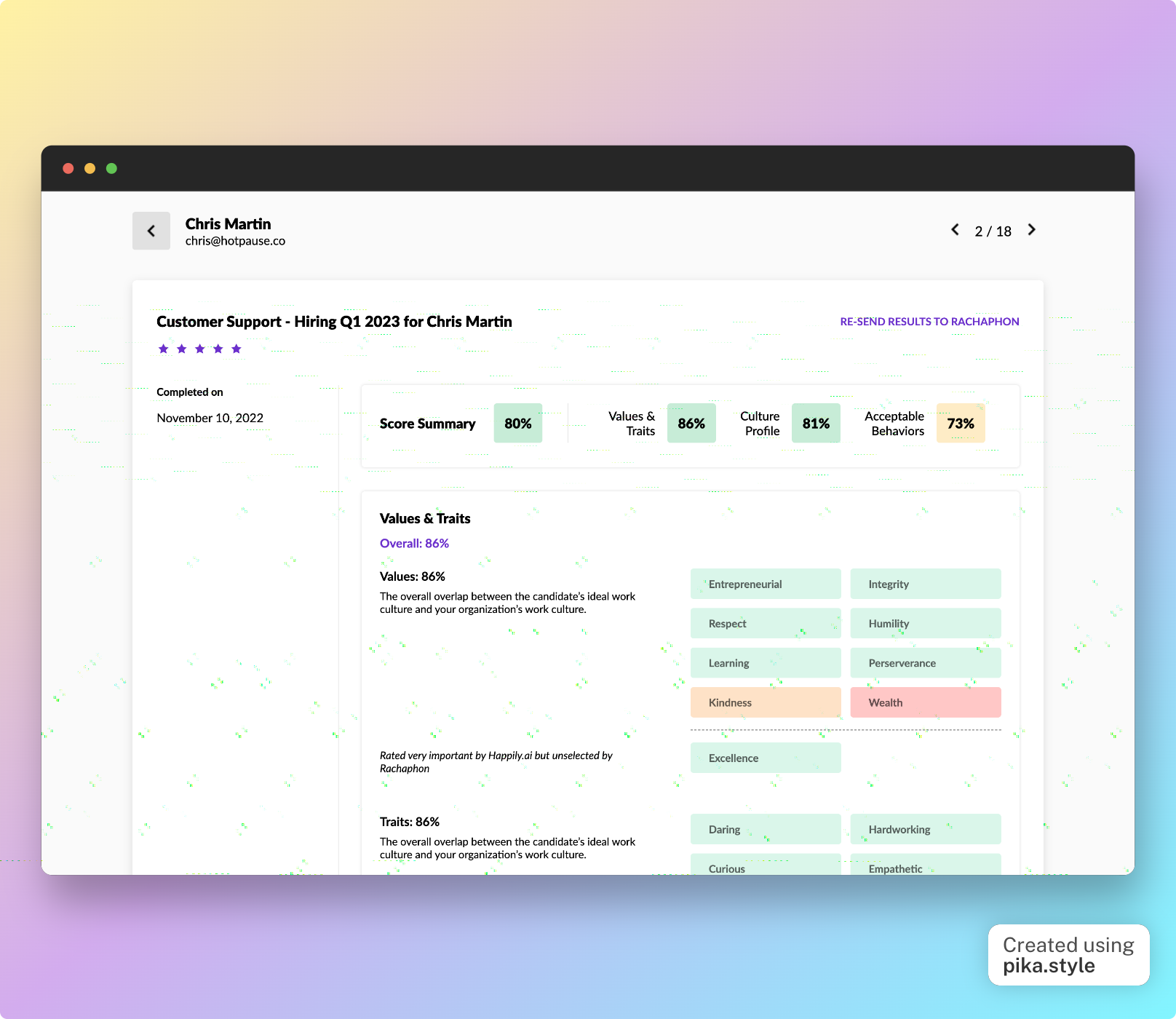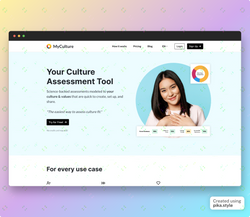What is Culture Fit and How to Assess it?
Culture fit has become an increasingly important factor in the hiring process for many companies. A strong culture fit not only benefits the employee, but it also has a positive impact on the overall success of the company. In this article, we will cover Culture Fit and How to assess it via the following structure:
a) What is Culture fit?
b) What are the benefits of ensuring culture fit?
c) Are HR departments in charge of ensuring culture fit?
d) What is a culture fit assessment test?
e) What are culture fit assessment questions?
What is culture fit?
Culture fit is an important factor that companies consider when hiring new employees. Having a culture fit means that an individual shares the same values and beliefs as the company, and is able to effectively align their behavior with the organization's goals and objectives. This is because an individual's values, beliefs, and behavior are key drivers of their actions and decisions, and can have a significant impact on the organization as a whole. When an individual has a strong culture fit with the company, it can lead to better communication, collaboration, and overall success within the organization.
What are the benefits of ensuring culture fit?
Businesses need to ensure culture fit because it can have a significant impact on the success of the organization. When an individual has a strong culture fit with the company, it can lead to better communication, collaboration, and overall success within the organization. This can help to create a harmonious work environment and foster a sense of community and camaraderie among employees. It can also lead to increased job satisfaction, as employees are more likely to enjoy their work and feel valued when they are able to align their personal values with those of the company. Some benefits of ensuring culture fit are as follows:
- Improved employee retention: When employees feel like they are a good fit for the organization's culture, they are more likely to stay with the company for longer periods of time. This can lead to lower turnover rates and lower recruitment and training costs.
- Increased productivity: Employees who feel like they fit in with the company culture are more likely to be engaged and motivated in their work. This can lead to higher productivity and better business performance.
- Enhanced company culture: Ensuring that employees are a good fit for the organization's culture can help to strengthen and maintain a positive company culture. This can lead to a more positive work environment and better employee morale.
- Improved decision-making: Hiring employees who fit in with the company culture can lead to better decision-making and problem-solving, as employees will be more aligned with the values and goals of the organization.
In contrast, a poor culture fit can lead to misunderstandings, conflicts, and a lack of collaboration among employees. It can also result in lower job satisfaction and increased turnover, as individuals who do not share the same values and beliefs as the company may find it difficult to feel fulfilled and valued in their roles. Therefore, it is important for businesses to ensure culture fit in order to create a positive work environment and foster success within the organization.
Are HR Departments in charge of ensuring culture fit?
Human resources (HR) departments often play a key role in ensuring culture fit within an organization. HR departments are typically responsible for recruiting, hiring, and onboarding new employees, and as such, they often have a significant influence on the overall culture and composition of the workforce. HR departments are typically responsible for ensuring culture fit during the hiring process by developing and implementing culture fit assessment tools, such as interviews, surveys, or assessments, to evaluate candidates' values, beliefs, and behaviors to see if they align with the organization's culture. By using effective recruitment and retention strategies, and by utilizing the right cultural assessment tools, HR representatives can support and uphold the company's values, beliefs and culture and ensure that employees are well-aligned with the organization's goals and objectives.
However, it's important to note that ensuring culture fit is not just the responsibility of HR departments. It's a shared responsibility that involves everyone in the organization, from senior leadership to individual employees. Ensuring culture fit requires ongoing efforts to communicate the organization's values and expectations, provide opportunities for employees to get to know one another, and create a positive and supportive work environment.
What is a culture fit assessment test?
A culture fit assessment test is a tool that is used by companies to determine whether a candidate has a strong culture fit with the organization. These tests typically use a combination of questions, activities, and assessments to evaluate an individual's values, beliefs, and behavior, and compare them to the company's values and culture.
Culture fit assessment tests can take a variety of forms, depending on the needs and goals of the organization. Some tests may focus on specific aspects of the company's culture, such as its values, mission, or goals. Others may be more general, and assess an individual's overall fit with the organization.
Some common types of culture fit assessment tests include:
- Personality tests: These tests are designed to assess an individual's personality traits, such as their level of extroversion, agreeableness, or openness. By comparing an individual's personality traits to those of the company's existing employees, these tests can help to determine whether they are a good fit with the organization.
- Values-based assessments: These assessments are designed to evaluate an individual's values and beliefs, and compare them to the company's values and culture. These assessments may include questions about an individual's priorities, beliefs, and goals, and may be used to assess their overall fit with the organization.
- Workplace scenarios or Acceptable behavior: These tests are designed to evaluate an individual's behavior and decision-making skills in different workplace scenarios. By presenting the candidate with hypothetical situations and asking them how they would respond, these tests can help to assess their fit with the company's culture and values.
Overall, culture fit assessment tests are an important tool that companies can use to determine whether a candidate is a good fit for the organization. By using these tests, companies can ensure that they are hiring individuals who share the same values and beliefs as the company, and who are able to align their behavior with the organization's goals and objectives.
What are Culture fit assessment questions?
Culture fit assessment questions are questions that are used to determine whether a job candidate's values, beliefs, and behaviors align with the organization's culture. These questions are often used in the hiring process to ensure that a candidate will be a good fit for the company's culture and will be able to thrive in the organization.
Here are some examples of culture fit assessment questions:
- How do you define a positive company culture?
- Describe a time when you had to adapt to a new company culture.
- How do you handle conflicts or differences in values with your colleagues?
- What are your values and how do they align with the values of our organization?
- How do you contribute to creating a positive work environment?
- How do you approach problem-solving in a team setting?
- How do you handle feedback, positive or negative?
- How do you prioritize tasks and manage your time effectively?
- How do you handle conflict or disagreement with colleagues or superiors?
- How do you prioritize work-life balance?
- How do you build and maintain professional relationships with colleagues?
- Describe a time when you had to adapt to a new role or take on additional responsibilities.
- How do you handle stress or pressure in the workplace?
- How do you handle unexpected challenges or setbacks in your work?
- Describe a time when you had to communicate complex or technical information to a non-technical audience.
- How do you approach collaborating with cross-functional teams?
- How do you contribute to a positive and inclusive team culture?
- How do you handle difficult conversations or confrontations with colleagues?
- How do you approach giving and receiving feedback?
- How do you define collaboration and teamwork in the workplace?
These are just a few examples of the types of questions that might be asked as part of a culture fit assessment.
Conclusion
In conclusion, culture fit is an important consideration for businesses of all sizes and industries. Ensuring that employees are a good fit for the organization's culture can lead to improved employee retention, increased productivity, a stronger company culture, and improved decision-making. HR departments are typically responsible for ensuring culture fit during the hiring process, but it's a shared responsibility that involves everyone in the organization. To ensure culture fit, it's important for businesses to regularly assess and communicate their values, provide opportunities for employees to get to know one another, and create a positive and supportive work environment. By prioritizing culture fit, businesses can create a positive and supportive work environment that helps to attract and retain top talent and supports long-term success.
Try a tool like MyCulture to assess culture fit within your organization!










